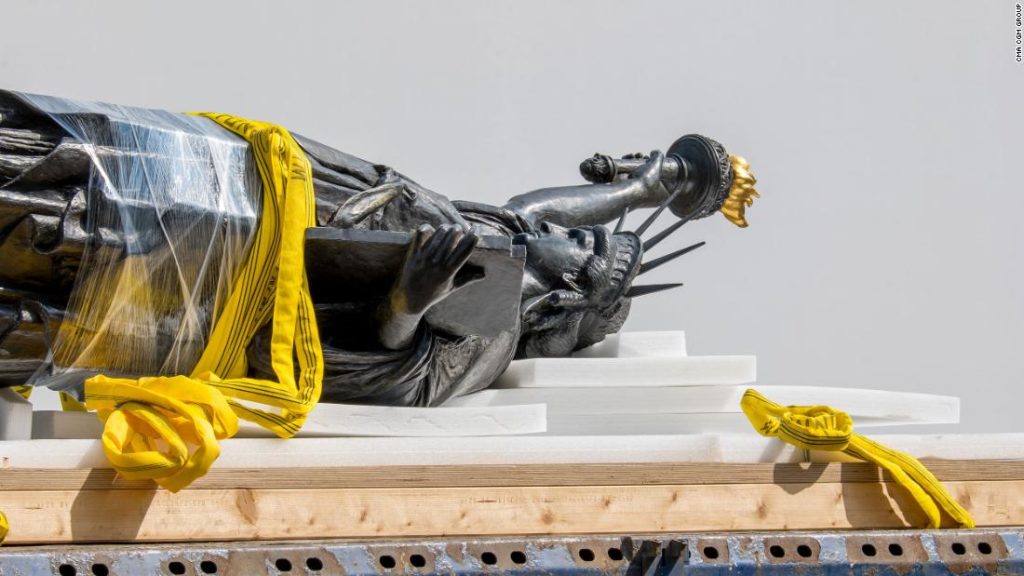New Yorkers have a surprise gift to look forward to for this Independence Day: a second Statue of Liberty sent by France. This new bronze statue, nicknamed the “little sister,” is one-sixteenth the size of the world-famous one that stands on Liberty Island. On Monday, during a special ceremony, the smaller sibling was lifted and loaded into a special container at the National Museum of Arts and Crafts (CNAM) in central Paris, where it has been installed since 2011 in the museum’s garden. It will be erected on Ellis Island, just across the water from the original, from July 1 to July 5.
The statue, over 450 kilograms (992 pounds) in weight and just shy of 10 feet tall, was first made in 2009. It is an exact replica of the original 1878 plaster model preserved by CNAM.
“The statue symbolizes freedom and the light around all the world,” said Olivier Faron, general administrator of the CNAM. “We want to send a very simple message: Our friendship with the United States is very important, particularly at this moment. We have to conserve and defend our friendship.”

The 9-foot, bronze statue will be displayed on Ellis Island on Independence Day. Credit: CMA CGM Group
The date of the ceremony was symbolic as well, held just after the 77th anniversary of D-Day during World War II, when American and other Allied soldiers landed on French soil in 1944, marking the beginning of the liberation of Western Europe from Nazi occupation.
The iconic Statue of Liberty that arrived in New York in 1886 was also meant to strengthen the Franco-American friendship, at a time when Paris and Washington were slowly drifting apart, as French historian André Kaspi reminded in a speech during the ceremony.

After Independance Day, it will be installed outside the French Ambassador’s residence in Washington, D.C. on Bastille Day — July 14. Credit: CMA CGM Group
The original Lady Liberty
In 1871, under the new Third Republic, Frédéric-Auguste Bartholdi, the chosen sculptor, traveled across the Atlantic to sell the project to the American government and to scout for potential locations. US President and former Union General Ulysses S. Grant initially met his proposal with indifference, according to Kaspi.
Even though Bartholdi eyed the formerly named Bedloe’s Island in New York Harbor as the ideal location for the future statue — all inbound ships to New York passed by it at the time — it wasn’t until 1875 that Bartholdi made a formal request to Grant to use it as the official site. To pay for the statue, the two countries struck a deal: the French funded the statue, while the Americans funded the pedestal.

The value of freedom is central to the new Lady Liberty statue. Credit: CMA CGM Group
Bartholdi’s sculpture of copper plates over an iron frame took nearly a decade to complete. The structure was conceptualized by engineer Eugène-Emmanuel Viollet-le-Duc, but when he died in 1879, just four years into its creation, Alexandre-Gustave Eiffel, the French engineer best known for constructing the Eiffel Tower, finished the task. The 225-ton statue departed disassembled for New York in 1885, onboard a steamer, and was inaugurated in New York the following year by a new president, Grover Cleveland, who hailed Bartholdi as “the greatest man in America today.”
Over a century later, Faron and the CNAM put forward the best of French craftsmanship through a local workshop to make sure the modern replica keeps this great heritage. A team of five at the art foundry Susse Fondeur in Malakoff spent four months to finish the statue. “It’s made with all the conditions to respect the original model of Bartholdi,” Faron said.
The journey for the “little sister” has just begun: Following the footsteps of the original statue, it will board a ship at the port city of Le Havre on June 19 and reach New York on July 1. Its final destination will be Washington, DC, where it will be on display for 10 years at the French ambassador’s residence.
You may also like
-
Afghanistan: Civilian casualties hit record high amid US withdrawal, UN says
-
How Taiwan is trying to defend against a cyber ‘World War III’
-
Pandemic travel news this week: Quarantine escapes and airplane disguises
-
Why would anyone trust Brexit Britain again?
-
Black fungus: A second crisis is killing survivors of India’s worst Covid wave

